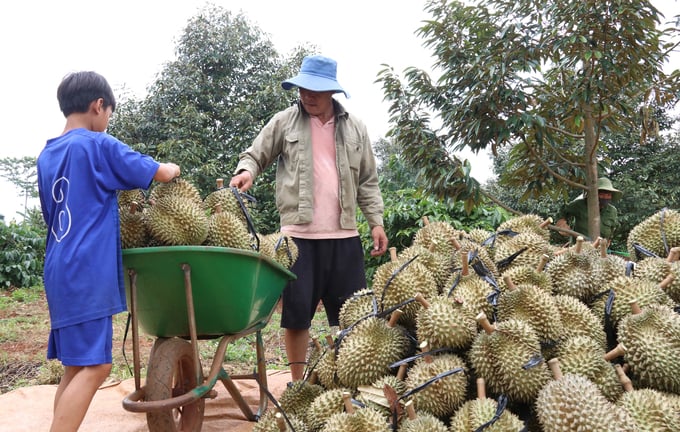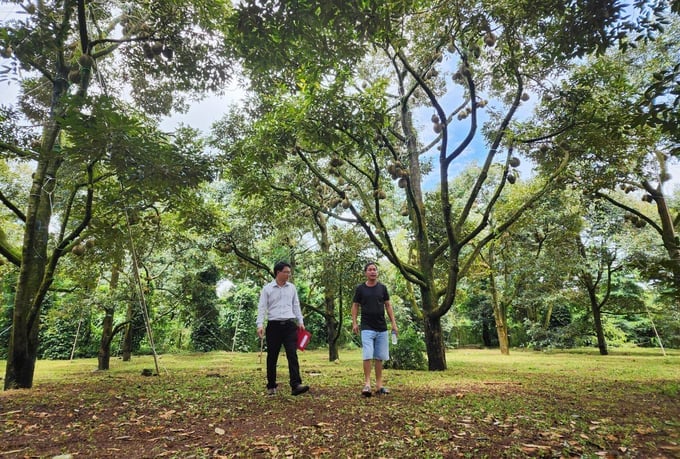May 31, 2025 | 05:04 GMT +7
May 31, 2025 | 05:04 GMT +7
Hotline: 0913.378.918
May 31, 2025 | 05:04 GMT +7
Hotline: 0913.378.918
Dak Lak Provincial People's Committee recently held a conference to summarize the durian industry's direction and tasks for 2024.
Dak Lak province currently houses 32,785 hectares of durian production area, which is an increase of over 10 thousand hectares compared to that of 2022. The local durian output in 2023 is estimated at 281,350 tons, which is an increase of 93,364 tons compared to that in 2022. Despite having the largest durian production area nationwide, Dak Lak's durian output ranks second after Tien Giang province. Additionally, the total revenue from the 2023 durian crop is estimated at between 1 and 1.2 billion Vietnamese dong per hectare, with a profit of 700 million Vietnamese dong per hectare.
Dak Lak's durian exports to the Chinese market in 2023 amounted to approximately 40 to 45 thousand tons, with a value between 150 and 160 million USD. In reality, the value of Dak Lak's durian exports is significantly higher because the majority of local production areas have established contracts with businesses outside the province.
According to Mr. Nguyen Hac Hien, General Director of Dak Lak province's Sub-Department of Crop Production and Plant Protection, durian prices have seen a considerable increase in recent years, which is an encouraging signal for local farmers.

Dak Lak province currently boasts the largest durian production area nationwide with over 32 thousand hectares. Photo: Quang Yen.
However, the current rapid expansion of durian production areas, aggravated by the failure to comply with recommendations by regulatory agencies and specialized organizations, may lead to challenges in terms of oversupply, surplus production, unsuitable production areas, and inadequate water management. Consequently, these challenges can result in the reduced productivity and quality of local durian products. The expansion of durian production in unsuitable areas has also led to the disruption of planning for other crops.
There are 68 durian production areas in Dak Lak province currently assigned with production unit codes for export China, with a total area of approximately 2,521 hectares. On the other hand, 147 durian production areas, with a total area of 3,500 hectares, are under inspection and pending China's approval. Consequently, only 7% of the total durian production area in Dak Lak province have been provided with a production unit code .
"The durian production areas are fragmented, lacking large-scale raw material zones, and farmers' technical skills are limited. They also lack the understanding and capacity to produce goods professionally in accordance with the regulations of importing countries. The connection between production area representatives, exporters, and farmers is not transparent, or sustainable," said Mr. Hien.
According to Mr. Hien, several businesses fail to maintain product quality or fully comply with the importing country's plant quarantine regulations after being assigned production unit codes. Notably, a number of Vietnamese durian shipments recently received warnings from China regarding mealybug contamination. As a result, corresponding businesses were temporarily suspended from using their production unit codes for failing to pass China's plant quarantine inspection.

Dak Lak's durian industry currently faces numerous challenges stemming from the rapid expansion of production areas. Photo: Quang Yen.
The majority of durians harvested from coded production areas are primarily sold to traders, resulting in the lack of interest in production unit codes and origin traceability. Packaging facilities typically follow a seasonal schedule, which makes it challenging to conduct investigations into the causes for violations and implement corrective measure when the importing country issues warnings regarding plant quarantine violations. Malpractices, theft of production unit codes, overly competitive trading activities, premature price fixing, and farmers' willingness to breach contracts pose as significant obstacles to the sustainable development of the durian industry.
Mr. Nguyen Quang Hieu, Director of the International Cooperation Department under the Department of Plant Protection, quality improvement is crucial to the development of the durian industry. Additionally, stakeholders must impose strict control over the production process to enhance durian quality.
According to Mr. Hieu, building industry credibility will expand target market range, and increase income for farmers. Furthermore, quality improvement will enhance the competitiveness of Vietnam's durian industry on the global stage.

China remains as the primary consumption destination for Vietnamese durians. Photo: Quang Yen.
"In order to improve the quality of durians, it is necessary to establish a legal framework regarding production unit codes and packaging facility codes. We must also promote inspection and monitoring efforts to promptly detect and handle code violations and fraud.
Orienting the industry towards sustainability, creating space for equal cooperation between farmers and businesses, and developing value chains with a close connection between different stages are crucial. Furthermore, we need to establish mechanisms and policies to support infrastructure investment in large-scale processing and preservation facilities, with a focus on enhancing production linkages," emphasized Mr. Hieu.
According to Mr. Le Anh Trung, Vice Chairman of the Dak Lak Durian Association, China the primary consumption destination for Vietnamese durians. However, Vietnamese durians have recently faced continuous warnings from importing countries. Consequently, Vietnam's durian industry must formulate appropriate solutions and actions in response. Notably, importing countries may impose restrictive measures which can diminish the brand reputation of Vietnamese durians internationally.
"Dak Lak durians can be harvested after a relatively short cultivation period, and the yields are high. However, harvesting during the rainy season can result in fungal diseases and poor fruit quality. The moisture content of Dak Lak durians is only 28%, which is significantly lower than that of Thailand. As a result, we need to establish standardized procedures for durian cultivation and harvesting. Additionally, pre-harvest sampling is necessary to protect consumers and businesses," Mr. Trung emphasized.
Consequently, Mr. Le Anh Trung proposed Dak Lak Provincial People's Committee to allocate funds to the Association to enhance technical training processes, promote collaboration with experts to adopt new techniques in production and harvesting, and conduct pre-harvest sampling.
"The Association will cooperate with local governments to strengthen inspection and monitoring efforts in durian production areas and packaging facilities. The early issuance of Vietnamese standards for the durian industry is crucial. Accordingly, the Provincial People's Committee needs to allocate funding for VietGAP certification for durian production areas," added Mr. Trung.
According to Mr. Nguyen Thien Van, Vice Chairman of the Provincial People's Committee, the durian industry, and the agricultural sector as a whole, are facing considerable challenges and difficulties.
With the aim of achieving sustainable development in the local durian industry and ensure effective production organization, Dak Lak province will focus on meeting the requirements for Good Agricultural Practices (VietGAP), GlobalGAP, HACCP, ISO:22.000, among many others. The province is also actively developing production unit codes, packaging facility codes, traceability systems, and effective control measures over plant quarantine subjects.
According to Mr. Van, the province will enhance the capacity of local processing and cold storage facilities, promote deep processing, develop brands, and facilitate trade promotion to meet the requirements of importing countries.
The development of the durian industry will follow planning; advanced technology will be applied to increase added value and ensure sustainable development. Encouraging the development of green, clean agriculture, and ensuring sustainable durian farming practices without the use of harmful chemicals throughout the cultivation, preservation, and processing stages will also be prioritized.

Mr. Nguyen Thien Van, Vice Chairman of the Dak Lak Provincial People's Committee, emphasized that the province will focus on improving quality to ensure sustainable development of the durian industry. Photo: Quang Yen.
On the other hand, it is essential to adhere to product quality standards to meet quality requirements. In addition, enhancing training and guidance for households within coded production areas is crucial. Farmers should be instructed to follow GAP processes, ensure food safety and hygiene, manage pests and diseases in a safe and biological manner, and maintain production records for origin traceability to meet the requirements of both domestic and export markets, with a special focus on the Chinese market.
"Promoting the establishment of production linkages between businesses, cooperatives, cooperative groups, and farms to transition from passive consumption to contract-based production and consumption is essential. We must also strengthen inspection, monitoring, and guidance efforts for production areas and packaging facilities to ensure compliance with the regulations outlined in the Decree on durian exports from Vietnam to China. This set of measures is the most viable solution for the long-term sustainable development of durian industry," emphasized Mr. Van.
Translated by Nguyen Hai Long

(VAN) Seafood by-products are opening a new path, combining green growth and technological innovation to enhance the industry's value.

(VAN) Mr. Nguyen Thanh Cong, Vice Chairman of the Son La Provincial People's Committee, reflects on Son La’s journey from barren hills to fruitful orchards after a decade of hard work.

(VAN) FAO’s Director-General addresses the 5th Baghdad International Water Conference.
/2025/05/26/1716-4-nongnghiep-191706.jpg)
(VAN) Chain linkages, technological innovation, and raw material zoning are three strategic pillars for the coconut industry to strongly develop and elevate its position on the global agricultural map.
![Advanced mariculture – an inevitable trend: [4] Accompanied by scientists](https://t.ex-cdn.com/nongnghiepmoitruong.vn/608w/files/sohk/2025/05/13/1941-pgsts-vo-van-nha-140958_717.jpg)
(VAN) According to Assoc. Prof. Dr. Vo Van Nha, Director of the RIA III, the development of advanced offshore mariculture is no longer an option but an essential path for Vietnam’s fisheries sector.

(VAN) Vietnam is intensifying the development of mollusk farming areas that meet international standards, aiming for sustainable growth and enhancing its export position in the global seafood market.
![Advanced mariculture – an inevitable trend: [3] Policy-driven momentum](https://t.ex-cdn.com/nongnghiepmoitruong.vn/608w/files/doanhtq/2025/05/21/0104-0616-0348-nuoi-bien-170339_789.jpg)
(VAN) To ensure the success of offshore mariculture that uses advanced technologies, it is essential to establish supportive policies that inspire both individuals and enterprises to invest with confidence.